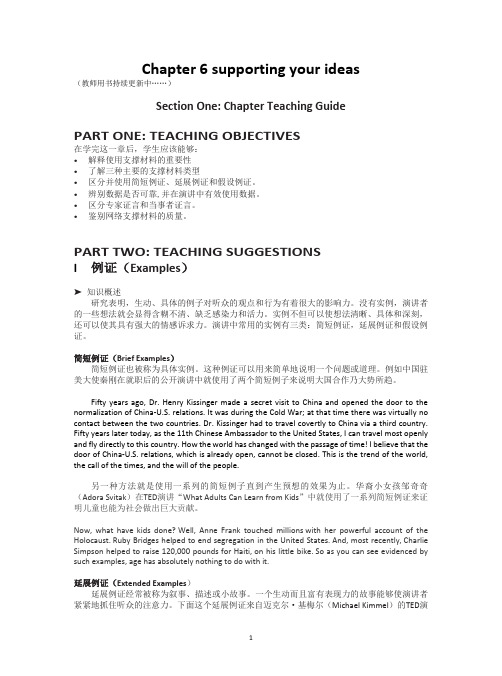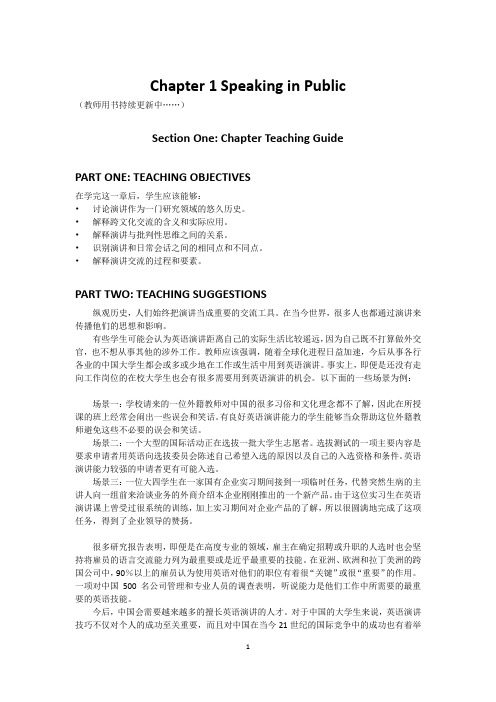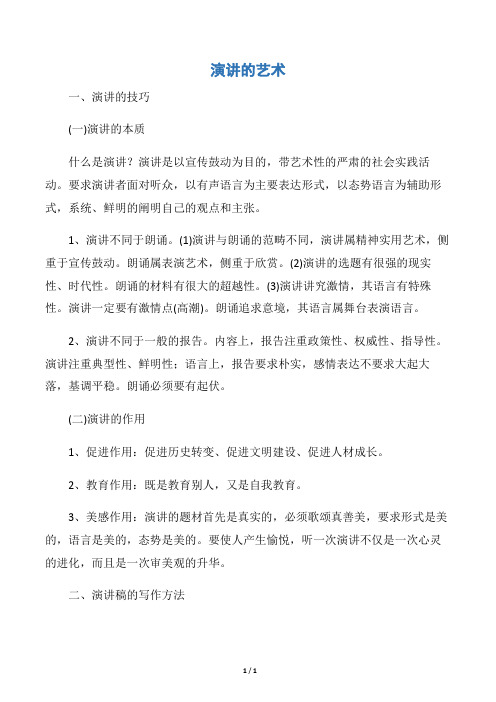《演讲的艺术》.ppt
演讲的艺术

The art of effective communication between a speaker (or writer) and anThe ability to respect diversity and toFocused, organized thinking about such things as the logicalideals, the soundness of evidence, and the differences between’s messageThe sum of a person’s knowledge, experience, goals, values, andhormone released into the bloodstream in response to physical orMental imaging in which a speaker vividly pictures himself or herselfStealing ideals or language from two or three sources andFailing to give credit for particular parts of a speech that areTo restate or summarize an author's ideals in one's own wordsstatement in the introduction of a speech that identifies theA method of speech organization in which the main pointsA method of speech organization in which the main points divide theA word or phrase that indicates when the speaker has finished one thoughtpresented from a brief set of notesa speechWhat a speaker wants the audience to rememberthe audience foremost in mind at every step ofThe tendency of people to be concerned above all with their own value,Audience characteristics such as age, gender, education,Questions that require responses at fixed intervals along a scale ofthat allow respondents to answer however theymaterials used to support a speaker's ideas. The threeA story, narrative, or anecdote developed at some length toa speech together in a particular way to achieve aThe major points developed in the body of a speech. Most speechesmethod of speech organization in which the main pointsmethod of speech organization in which the main points follow amethod of speech organization in which the first mainof a problem and the second main point presents aA method of speech organization in which the main points divide theA word or phrase that indicates when a speaker has finished one thoughtstatement in the body of the speech that summarizes theA very brief statement that indicates where a speaker is in the speech or thatA question that the audience answers mentally rather than outstatement in the introduction of a speech that identifies the课后练习Chapter 4Topic :Studying abroadGeneral Purpose:To persuadeSpecific Purpose:To persuade the audience to study abroad will enhance your personal development,academic development,and career development.Central Idea:Main points: I. You should study abroad because it will enhance your personal development.II. You should study abroad because it will enhance your academic developmentIII. You should study abroad because it will enhance your career development.Topic : Events in triathlonGeneral purpose: To informSpecific purpose: To inform the audience of the three events in triathlon : swimming, cycling and running.Central Idea:Main points:The first event in triathlon is swimmingThe second event in triathlon is cycling.The third event in triathlon is running.I. The first major cause of airplane crashes is pilot error.II. The second major cause of airplane crashes is weather. Topical OrderIII. The third major cause of airplane crashes is mechanical failure.I. The peak of Mount Kilimanjaro has an arctic climate with snow,ice,,and violent winds.II. The middle of Mount Kilimanjaro has a rain forest climate with lush vegetation and diverse animal species.III. The base of Mount Kilimanjaro has a bushland climate with pastures and farming communities. Spatial OrderI. The Chinese film industry began in the early 20th century.II. The first golden period of Chinese cinema occurred during the 1930s.III. The second golden period occurred in the years after World War II.IV. The Chinese film industry was scaled back during the 1960s and 1970s.V. Today Chinese films are in another golden period of international acclaim.Chronological Order。
演讲的艺术(第十三版)(中国版)教师用书U6

Chapter 6 supporting your ideas(教师用书持续更新中……)Section One: Chapter Teaching GuidePART ONE: TEACHING OBJECTIVES在学完这一章后,学生应该能够:•解释使用支撑材料的重要性•了解三种主要的支撑材料类型•区分并使用简短例证、延展例证和假设例证。
•辨别数据是否可靠,并在演讲中有效使用数据。
•区分专家证言和当事者证言。
•鉴别网络支撑材料的质量。
PART TWO: TEACHING SUGGESTIONSI例证(Examples)➤知识概述研究表明,生动、具体的例子对听众的观点和行为有着很大的影响力。
没有实例,演讲者的一些想法就会显得含糊不清、缺乏感染力和活力。
实例不但可以使想法清晰、具体和深刻,还可以使其具有强大的情感诉求力。
演讲中常用的实例有三类:简短例证,延展例证和假设例证。
简短例证(Brief Examples)简短例证也被称为具体实例。
这种例证可以用来简单地说明一个问题或道理。
例如中国驻美大使秦刚在就职后的公开演讲中就使用了两个简短例子来说明大国合作乃大势所趋。
Fifty years ago, Dr. Henry Kissinger made a secret visit to China and opened the door to the normalization of China-U.S. relations. It was during the Cold War; at that time there was virtually no contact between the two countries. Dr. Kissinger had to travel covertly to China via a third country. Fifty years later today, as the 11th Chinese Ambassador to the United States, I can travel most openly and fly directly to this country. How the world has changed with the passage of time! I believe that the door of China-U.S. relations, which is already open, cannot be closed. This is the trend of the world, the call of the times, and the will of the people.另一种方法就是使用一系列的简短例子直到产生预想的效果为止。
演讲的艺术

10% 读到的 20% 听到的 30% 看到的 50% 看到和听到的
演讲技巧——形体
演讲中要避免的
举止和动作
自鸣得意型 指挥动作,手舞足蹈
自恋自爱型 调整领带,整理头发
自说自话型 白日梦话,来回溜达
没精打采型 依靠式,懒洋洋式。手放在裤袋内摇动
胆怯紧张型 紧张的小动作,磨光台面式,见不得光式,裸体
回应问题可能是你显示的最重要的技巧。你的回应可能成为 听众是否被你的内容所折服的决定因素。
出于人的本性,我们往往会不由自主地立即做出反应,并解 答问题。但是演讲者应该采取的最有效行动却是先略作停顿 ,然后再以一种较有策略的饭食加以回答。停顿(PAUSE) 这一简单的英文单词能帮助你记住,在听众提出问题时应该 怎么办。
1. 演讲前熟悉和检查器材的操作和性能 2. 检查各作为的可视度 3. 先把胶片放好后在打开投影仪 4. 避免身体挡住屏幕或示范物 5. 避免对着屏幕、活动板说话或边写边说 6. 查问听众是否看得清楚 7. 不用时和解答问题前关掉机器 8. 用投影仪时可用纸掩盖未说明的部分 9. 可利用笔或指示物指向胶片中要说明的部分 10. 可以在胶片上把重点框起来 11. 可以利用空白胶片图解意思 12. 每一个重点将结过后,使用新的一页空白纸 13. 各种器材可以相互使用 14. 有些器材使用起来会花费时间
.........................................
.........................................
..........................................
..........................................
领导演讲艺术课件(PPT88张)

格物—随时找到方法的方法
组织 战略 MBA 生产 管理 人力 资源 财务 营销 招聘 解聘 奖惩 培训 人力 资源 制度 薪酬 劳保 绩效 考核 培训 目的 方案 设计 师资 选择
品牌 建设
资本 运营
会场
效果 评估
设备
会务
流程
签到
责任人
培训 主题 训后 评估 时间 地点
培训 对象 培训 会务 安排
而现在, 乡愁是一湾浅浅的海峡。 我在这头,
大陆在那头。
学习团队组建
1.每组竞选出一位组长,由组长带领组员确 定:队长,队名,队训 2.每组派出一名代表竞选演说竞选班长,从 三个方面陈述: 一、我为什么竞选班长
二、我凭什么竞选班长 三、我将怎么样当好班长
演讲的基本功修炼
演讲的三个意识
打开自己 脱口而出 热爱丢脸
自我介绍四个一
一个问候 一点幽默 一点智慧
一点价值
个人魅力的五个一
一首诗
一首歌
候, 乡愁是一枚小小的邮票。 我在这头, 母亲在那头。 长大后, 乡愁是一张窄窄的船票。 我在这头,
新娘在那头。
后来啊, 乡愁是一方矮矮的坟墓。 我在外头,
母亲在里头。
场地、道具运用
根据培训形式选择场地
音响设备直接影响效果
灯光强弱调节的熟悉
场地要有互动的空间
桌椅的摆放符合培训主题
提前先检查好所有准备工作
音乐是演讲的灵魂
高能量音乐
礼仪音乐
催眠音乐 情感音乐 分享音乐
总裁演讲的内容组织
一个小时演讲的秘密
1小时要有3个观点
1小时要有3个案例
1小时要有3个故事
1小时要有1个互动
1小时要有1段视频
演讲的艺术(共9张PPT)

McGraw-Hill
© 2007 Stephen E. Lucas. All rights reserved.
Slide 3
Methods of Delivery
• Reading from a manuscript • Reciting from memory • Speaking impromptu • Speaking extemporaneously
• Pause: a momentary break in a vocal delivery of a
speech
Effectively pause between every though pattern
McGraw-Hill
© 2007 Stephen E. Lucas. All rights reserved.
Vocal Variety
• Pronunciation and articulation
McGraw-Hill
© 2007 Stephen E. Lucas. All rights reserved.
Slide 9
Speakers’ Body
• Personal appearance • Eye contact • Gesture • Movement
McGraw-Hill
© 2007 Stephen E. Lucas. All rights reserved.
your own voice always sound louder to you your own voice always sound louder to you than to a listener.
the speed at which a person speak
《演讲技巧》ppt演示课件

端正态度酝酿激情
演讲中的“演”
表情的威力
眼神的魅力
动“手”演讲
“身动”制造“生动”
各种异常情况的处理
各种异常情况的处理
随便进进出出怎么办?
各种异常情况的处理
打手机或手机响怎么办?
各种异常情况的处理
有人窃窃私语怎么办?
各种异常情况的处理
有人打瞌睡怎么办?
各种异常情况的处理
提问冷场怎么办?
海在我们的脚下沉吟着,诗人一般。那声音仿佛是朦胧的月光和玫瑰的晨雾一般。又像是情人的密语那样芳醇;低低地,轻轻地,象微风拂过琴弦;像落花飘零在水上。 海睡熟了。 大小的岛拥抱着,偎依着,也静静地恍惚入了梦乡。 星星在头上眨着慵懒的眼睑,也像要睡了。 许久许久,我俩也象入睡了似的,停止了一切的思念和情绪。 不晓得过了多少时候,远寺的钟声突然惊醒了海的酣梦,它恼怒似的激起波浪的兴奋,渐渐向我们脚下的岩石掀过来,发出汩汩的声音,象是谁在海底吐着气,海面的银光跟着晃动起来,银龙样的。接着我们脚下的岩石就象铃子、铙钹、钟鼓在奏鸣着,而且声音愈响愈大起来。
井冈山五百里林海里,最使人难忘的是毛竹。
“……人群里,年长的是大娘,大爷,同年的是大哥,大嫂,兄弟,姐妹,都是亲人。又仿佛队伍同时是群众,群众又同时是队伍,根本分不清……”
她猛然喊了一声。脖子上的钻石项链没有了。 她丈夫已经脱了一半衣服,就问:“什么事情?” 她吓昏了,转身向着他说: “我……我……我丢了佛来思节夫人的项链了。” 他惊惶失措地直起身子,说: “什么!……怎么啦?……哪儿会有这样的事!” 他们在长衣裙褶里,大衣褶里寻找,在所有口袋里寻找,竟没有找到。 他问:“你确实相信离开舞会的时候它还在吗?” “是的,在教育部走廊上我还摸过它呢。” “但是,如果是在街上丢的,我们总得听见声响。一定是丢在车里了。” “是的,很可能。你记得车的号码吗?” “不记得。你呢,你没注意吗?” “没有。” 他们惊惶地面面相觑……
《演讲的艺术》PS_ W2

Most crucial from an ethical standpoint, though, is being fully informed about your subject—doing enough research. Don’t communicate erroneous information or misleading advice!
Do your listeners lean forward in their seats, as if paying close attention?
Do they applaud in approval? Do they laugh at your jokes? Do they have quizzical looks in their faces? Do they shuffle their feet and gaze at the clock?
.
6.The Speech Communication Process :
Interference—external interference and internal interference.
As a speaker, you must try to hold your listener’s attention despite these various kinds of reference.
1. The Importance of Ethics
The goal of public speaking is to gain a desired response from the listeners— but not at any cost.
Speechmaking is a form of power and therefore carries with it heavey ethical responsibilities. In an ideal world, all public speakers would be truthful and devoted to the good of society. Yet history tells us that the power of speech is often abused—sometimes with disastrous results. The power of the spoken word needs to be guided by a strong sense of ethical integrity
演讲的艺术PPT

(A word or phrase that connects the ideas of speech indicates the relationship between them.)
丘武贤 1
•TRANSITIONS
four types
•INTERNAL PREVIEWS
*Examples:P98
3
Internal previews:
•A statement in the body of the speech that lets the audience know what the speaker is going to discuss next.
4
•In effect,an internal previews works just like the preview statement in a speech introduction,except that it comes in the body of the speech-usually as the speaker is starting to discuss a main point.
•INTERNAL SUMMARIES
•SIGNPOSTS 2
Transitions:
*A word or phrase that indicates when a speaker has finished one thought and is moving on to another.
*Transitions state both the idea the speaker is leaving and the idea he or she is coming up to.
演讲的艺术ppt课件

28
The Art of Public Speaking
什么是要点
16
中心思想
用一句简单的句子总结或表达演讲的主要内容 留存信息:你希望听众忘记所有演讲内容后记住的东西 中心思想在很大程度上暗示了演讲的内容
中心思想的指南
中心思想应该用一个完整的句子表达出来,避免疑问与修辞 中心思想一定要意思明确,不能产生任何的歧义 中心思想必须告诉听众你的话题的答案,而不是仅仅抛出问题
The Art of Public Speaking
【美】 史蒂芬· E·卢卡斯
演讲的艺术
The Art of Public Speaking
公共演讲
将你的个人观点通过与他人分享并影响他人的态度从而达到公共化的一种途径
演讲中常用的沟通技巧
逻辑清晰地组织自己的思想 根据不同对象剪裁自己的话:使对方能够轻松明白 讲故事要达到最好效果:不断调整自己的语音、语调,获得最佳效果 接受听众的反馈:通过语言和非语言了解听众的反馈情况
对演讲话题的态度
兴趣:你的任务就是调动学员的积极性,使他们对主题产生兴趣 知识:人们往往只是对自己知道的事情感兴趣 态度:听众的态度决定了他处理演讲的方式
对演讲人的态度
听众觉得讲师的水平越高,他们就会越相信你
22
演讲前适应听众
听众会对你的演讲做出什么样的反应 调整自己要说的话,以便是演讲清晰、合适、更具说服力 你要彻底隐藏自己的观点,让自己能够暂时采纳别人的观点 做到了这样,你就可以通过别人的耳朵听到自己的演讲,并适当调整
高中语文粤教必修一《演讲的艺术》孙胜韬PPT课件 上课新名师优质课获奖公开面试试讲

完
PP阵T课形件 2:2013年课标卷16题 在下面一段文字横线出补写恰当的语句,使整段文字语
意完整连贯,内容贴切,逻辑严密。每处不超过12个字
(6分)
水是植物主要的组成成分,植物体的含水量一般为
60%-80%,有的甚至可达90%以上。 ①
,土
壤中的矿物质、氧、二氧化碳等都必须先溶于水后,
②
。水还能维持细胞和组织的紧张度,以利于各
电子商务存在的价值之一,就是通过互联网进
行网上购物、网上支付,节省消费者与商家的 时间和空间,①从而大大提高交易效率 。对于工作忙碌的 上班族而言,② 除了大量节省宝贵时间,还易于达到货 比三家、快乐购物的目的。在信息多元化的 21 世纪,③ 上网浏览商品信息,完成购物,已经成为许 多消费者的习惯。
P2P.T在课件下面横线处补写恰当的语句,使整段文字语意完整 连贯,内容贴切,逻辑严密。每处不超过12个字。
大家都知道,①__,倘若呼吸停止,生命也将终结。 人体通过呼吸,②__,排出二氧化碳。那你可知道土 壤也有呼吸?土壤呼吸和人的呼吸一样,也是一个③ __的过程。
答案示例: ①一个人活着就必须呼吸 ②从大气中吸入氧气 ③吸入氧气释放二氧化碳
在下面一段文字横线处补写恰当的语句,使整段 文PPT字课件语意完整连贯,内容贴切,逻辑严密。每处不
超过20个字。
不要敬畏它的神秘
命运总是与你一同存在。① ,虽然有时它深
不可测;不要惧怕它的无常,虽然有时它来去无踪。 在你彻底绝望的时候,别②忘了自己;拥在有你一得半意的忘命运形的
时候,别忘了上帝手里还有一半的命运。你的努力
P(PT2课0件15年高考新课标全国卷Ⅱ)在下面一段文字 横线处补写恰当的语句,使整段文字语意完整连 贯,内容贴切,逻辑严密。每处不超过15个字。
演讲的艺术 chapter 6

McGraw-Hill
© 2007 Stephen E. Lucas. All rights reserved.
Slide 16
Citing Your Sources
“Oral footnotes”. . .
• Enhance the credibility of what you say. • Help listeners find sources.
Tea is popular. Large quantities of tea are consumed by people around the globe. Tea is second only to water as the world’s most consumed beverage. More tea is consumed each year than all other manufactured drinks in the world put together, including coffee, chocolate, soft drinks and alcohol. Total tea consumption is 4 billion kilograms annually.
Slide 2
McGraw-Hill
© 2007 Stephen E. Lucas. All rights reserved.
Slide 3
Learning Objectives:
• Supporting your ideas by:
examples
statistics testimony
McGraw-Hill
Slide 10
Statistics
• Single • Multiple • Tips:
演讲的艺术

•Another way to accomplish the same thing is to introduce your main points with a question. •Besides using signposts to indicate where you are in the speech,you can use them to focus attention on key ideas.(do this with a simple
*Examples: 98
P
•A statement in the body of the speech that lets the audience know what the speaker is going to discuss next.
Internal previews:
•In effect,an internal previews works just like the preview statement in a speech introduction,except that it comes in the body of the speech--usually as the speaker is starting to discuss a main point. • Internal previews are often combined with transitions.
•A very brief statement that indicaБайду номын сангаасes where a speaker is in the speech or that focus attention on key ideas.
高中语文必修一第一单元 :演讲的艺术--课堂演说分享活动展示课(共50张PPT)

素 材 迁 移
中第一流”。
213de小小仙女 晓洁老师
谢谢大家 我们下期再会
谢谢欣赏
玛格丽特·米切尔 ·作者简介 ·内容梗概 ·体会感悟 ·素材迁移
玛格丽特·米切尔,美国现代著名女 作家,曾获文学博士学位。 1900年11月8 日出生于美国的一个律师家庭。 曾就读 于华盛顿神学院,马萨诸塞州的史密斯学 院 。1922至1926年任地方报纸 《亚特 兰大日报》的记者。 她于1926年开始创 作《飘》,10年之后,作品才问世。 随 后,小说获得了1937年普利策奖和美国出 版商协会奖。
1、大声说NO 2、快速离开 3、告诉大人,不停地告诉大人,直到有人肯听你的话。
悲剧事件
15岁的小美(化名)来说, 每天都是在惶恐中度日,在长 达两年的时间里,她频繁遭受 着继父的性侵。近日,这名丧 心病狂的继父何某因犯强奸罪, 被(浙江)嘉兴海盐法院依法 判处有期徒刑7年。
最后希望我们不要像柴静说的那样“把无知当 纯洁,把愚昧当德行,把偏见当原则。”我们应 该以正确的眼光和心理去对待性知识。当我们接 触到有过性侵遭遇的人时,我们不应戴着有色眼 镜去看他们,应该给予他们充分的尊重。
----基于语文核心素养的课堂演说艺术活动
展 示 目 录
一
时 事 共 享
二
诗 歌 鉴 赏 共 享
三
小 说 鉴 赏 共 享
四
古 代 文 化 常 识 共 享
林奕含,台湾美女作家, 生于1991年。
2017年2月,出版了长 篇小说《房思琪的初恋 乐园》。 2017年4月27日傍晚与 自家卧室上吊自杀。
素材迁移
鹊桥仙
演讲的艺术(第十三版)(中国版)教师用书Chapter_1_Speaking_in_Public

Chapter 1 Speaking in Public(教师用书持续更新中……)Section One: Chapter Teaching GuidePART ONE: TEACHING OBJECTIVES在学完这一章后,学生应该能够:•讨论演讲作为一门研究领域的悠久历史。
•解释跨文化交流的含义和实际应用。
•解释演讲与批判性思维之间的关系。
•识别演讲和日常会话之间的相同点和不同点。
•解释演讲交流的过程和要素。
PART TWO: TEACHING SUGGESTIONS纵观历史,人们始终把演讲当成重要的交流工具。
在当今世界,很多人也都通过演讲来传播他们的思想和影响。
有些学生可能会认为英语演讲距离自己的实际生活比较遥远,因为自己既不打算做外交官,也不想从事其他的涉外工作。
教师应该强调,随着全球化进程日益加速,今后从事各行各业的中国大学生都会或多或少地在工作或生活中用到英语演讲。
事实上,即便是还没有走向工作岗位的在校大学生也会有很多需要用到英语演讲的机会。
以下面的一些场景为例:场景一:学校请来的一位外籍教师对中国的很多习俗和文化理念都不了解,因此在所授课的班上经常会闹出一些误会和笑话。
有良好英语演讲能力的学生能够当众帮助这位外籍教师避免这些不必要的误会和笑话。
场景二:一个大型的国际活动正在选拔一批大学生志愿者。
选拔测试的一项主要内容是要求申请者用英语向选拔委员会陈述自己希望入选的原因以及自己的入选资格和条件。
英语演讲能力较强的申请者更有可能入选。
场景三:一位大四学生在一家国有企业实习期间接到一项临时任务,代替突然生病的主讲人向一组前来洽谈业务的外商介绍本企业刚刚推出的一个新产品。
由于这位实习生在英语演讲课上曾受过很系统的训练,加上实习期间对企业产品的了解,所以很圆满地完成了这项任务,得到了企业领导的赞扬。
很多研究报告表明,即便是在高度专业的领域,雇主在确定招聘或升职的人选时也会坚持将雇员的语言交流能力列为最重要或是近乎最重要的技能。
【写作指导】演讲的艺术

演讲的艺术一、演讲的技巧(一)演讲的本质什么是演讲?演讲是以宣传鼓动为目的,带艺术性的严肃的社会实践活动。
要求演讲者面对听众,以有声语言为主要表达形式,以态势语言为辅助形式,系统、鲜明的阐明自己的观点和主张。
1、演讲不同于朗诵。
(1)演讲与朗诵的范畴不同,演讲属精神实用艺术,侧重于宣传鼓动。
朗诵属表演艺术,侧重于欣赏。
(2)演讲的选题有很强的现实性、时代性。
朗诵的材料有很大的超越性。
(3)演讲讲究激情,其语言有特殊性。
演讲一定要有激情点(高潮)。
朗诵追求意境,其语言属舞台表演语言。
2、演讲不同于一般的报告。
内容上,报告注重政策性、权威性、指导性。
演讲注重典型性、鲜明性;语言上,报告要求朴实,感情表达不要求大起大落,基调平稳。
朗诵必须要有起伏。
(二)演讲的作用1、促进作用:促进历史转变、促进文明建设、促进人材成长。
2、教育作用:既是教育别人,又是自我教育。
3、美感作用:演讲的题材首先是真实的,必须歌颂真善美,要求形式是美的,语言是美的,态势是美的。
要使人产生愉悦,听一次演讲不仅是一次心灵的进化,而且是一次审美观的升华。
二、演讲稿的写作方法演讲稿也叫演说辞,它是在较为隆重的仪式上或某些公众场所发表的讲话文稿,是演讲的依据,具有宣传、鼓动、教育和欣赏等作用,它可以把演讲者的观点、主张与思想感情传达给听众以及读者,使他们信服并在思想感情上产生共鸣。
讲演稿的结构形式是多种多样的,但归纳起来大致有三部分的内容。
一是提出问题,点出讲话的要点,引起听众的注意和兴趣;二是阐述讲演的主旨,分析要说明的问题;三是总束全文,照应开头,或提出希望祝愿,激励鼓舞听众。
写作演讲稿要注意以下三个特点:第一、针对性。
所谓针对性,首先是作者提出的问题是听众所关心的问题,评论和论辨要有雄辩的逻辑力量,要能为听众所接受并心悦诚服,这样,才能起到应有的社会效果;其次是要懂得听众有不同的对象,不同的层次,而“公众场合”也有不同的类型,在学校如升旗仪式、班会、知识竞赛、学生会干部竞聘等场合,写作时要根据不同场合和不同对象,为听众设计不同的演讲内容。
- 1、下载文档前请自行甄别文档内容的完整性,平台不提供额外的编辑、内容补充、找答案等附加服务。
- 2、"仅部分预览"的文档,不可在线预览部分如存在完整性等问题,可反馈申请退款(可完整预览的文档不适用该条件!)。
- 3、如文档侵犯您的权益,请联系客服反馈,我们会尽快为您处理(人工客服工作时间:9:00-18:30)。
2. The Psychology of Audiences
People may be compelled to attend a speech, but no one can make them listen unless they want to. It’s up to the speaker to make the audience do pay attention, they don’t choose to pay attention.
important to a speaker addressing that audience. In most cases, however, your audience analysis will proceed in light of six broad categories : size, physical setting, disposition toward the topic, the speaker, and the occasion.
2. The Psychology of Audiences
What these psychological principles mean u need some grasp of what your listeners know, believe, and care about.
To whom am I speaking?
What do I want them to know, believe, or do as a result of my speech?
What is the most effective way of composing and presenting my speech to accomplish that aim?
—your listeners will hear and judge what you say on the basis of what they already know and believe.
—you must relate your message to your listeners—show how it pertains to them, explain why they should care about it as much as you do.
Chapter Five
Analyzing the Audience
1. Audience-Centeredness
Good public speakers are audience-centered. They know the primary purpose of speechmaking is to gain a desired response from listeners.
You can remain true to yourself and speak ethically while adapting your message to the needs of a particular audience.
To be audience-centered, you should keep several questions in mind when you prepare your speeches:
Size:
—No matter what size group you are addressing, bear in mind one basic
principle: The larger the audience, the more formal your presentation must be.
Even when people do pay attention, they don’t process a speaker’s message exactly as the speaker intends. Auditory perception is always selective. Every speech contains two messages—the one sent by the speaker and the one received by the listener. What a speaker says is filtered through a listener’s frame of reference. People hear what they want to hear.
—You should learn enough about your audience to know what you should do to make your ideas clear and meaningful.
3. Factors in Audience Analysis
Definition: Anything characteristic of a given audience is potentially
People are egocentric. Very simply people usually want to hear about things that are meaningful to them.
What these psychological principles mean to you as a speaker:
Being audience-centered does not involve taking any means to and end. You should not compromise your beliefs to get a favorable response from the audience. Nor should you use devious, unethical tactics to achieve your goal.
